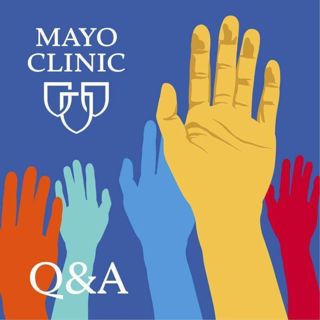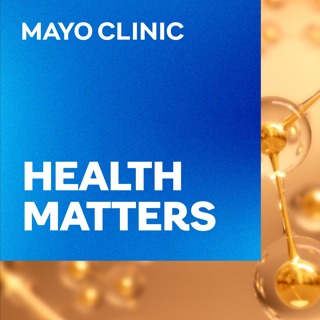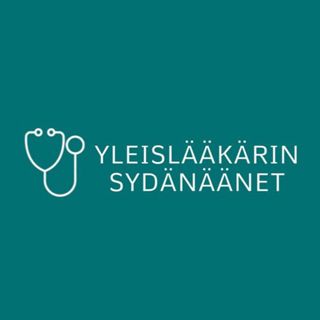
How artificial intelligence is revealing physiological age
The heart doesn’t lie, and you may be surprised to learn that your heart can even reveal your physiological age. Artificial intelligence (AI) applied to an EKG can now measure your body's health. On the debut episode of the Mayo Clinic Q&A podcast, Dr. Paul Friedman and Dr. Suraj Kapa — both Mayo Clinic cardiologists —explain how your body's age might differ from what's on your birth certificate. Advertising Inquiries: https://redcircle.com/brands Privacy & Opt-Out: https://redcircle.com/privacy
1 Heinä 20209min

The living-kidney donation option
While 6,000 people chose living-kidney donation in 2018, experts say the pool of potential donors is still untapped. Educating would-be donors and recipients about the advantages of living donation is key. Dr. Mikel Prieto, a Mayo Clinic transplant surgeon, discusses the living kidney donation option. Advertising Inquiries: https://redcircle.com/brands Privacy & Opt-Out: https://redcircle.com/privacy
24 Kesä 202010min

Cancer and nutrition
When it comes to fighting cancer or living with a cancer diagnosis, does what you eat make a difference? Nutrition is an important thing to consider for people with cancer. Eating healthy foods before, during, and after treatment can help patients feel better and stay stronger. On the Mayo Clinic Q&A, Dr. John Shin, a hematologist and oncologist, discusses nutrition and cancer. Advertising Inquiries: https://redcircle.com/brands Privacy & Opt-Out: https://redcircle.com/privacy
17 Kesä 202018min

Why it's critical for children to get their routine health care
The COVID-19 pandemic (https://www.mayoclinic.org/coronavirus-covid-19?mc_id=us&utm_source=newsnetwork&utm_medium=l&utm_content=content&utm_campaign=mayoclinic&geo=national&placementsite=enterprise&cauid=100721) has put a hold on many activities. But one thing that shouldn't fall by the wayside is your child's health. In this Mayo Clinic Q&A episode, Dr. Nipunie Rajapakse (https://www.mayoclinic.org/biographies/rajapakse-nipunie-s-m-d-m-p-h/bio-20308514), a pediatric infectious disease specialist (https://www.mayoclinic.org/departments-centers/infectious-diseases/sections/overview/ovc-20456906), discusses the importance of routine checkups, including keeping up with vaccination schedules (https://www.mayoclinic.org/healthy-lifestyle/infant-and-toddler-health/in-depth/vaccines/art-20045393). Advertising Inquiries: https://redcircle.com/brands Privacy & Opt-Out: https://redcircle.com/privacy
15 Kesä 20205min

Medical education during the COVID-19 pandemic
Across the world, one of the biggest changes forced by the COVID-19 pandemic is in the field of education. Programs from kindergarten through postsecondary have rapidly moved to a distance learning model. Online and remote instruction has its own unique challenges, and has required students and educators to be creative to stay connected. On the Mayo Clinic Q&A podcast, Dr. Alexandra Wolanskyj-Spinner, senior associate dean for student affairs at the Mayo Clinic Alix School of Medicine in Minnesota, discusses medical education during the COVID-19 pandemic. Advertising Inquiries: https://redcircle.com/brands Privacy & Opt-Out: https://redcircle.com/privacy
10 Kesä 202012min

Precautions for a summer of COVID-19
With the onset of warmer weather and more and more states loosening their COVID-19 restrictions, lots of folks are wondering about some summer staples, like cookouts and a day at the beach or pool. On the Mayo Clinic Q&A podcast, Dr. Nipunie Rajapakse (https://www.mayoclinic.org/biographies/rajapakse-nipunie-s-m-d-m-p-h/bio-20308514), an infectious disease specialist at Mayo Clinic, discusses how you can minimize your risk during common summertime scenarios. Advertising Inquiries: https://redcircle.com/brands Privacy & Opt-Out: https://redcircle.com/privacy
9 Kesä 202017min

How information technology helps in the COVID-19 response
During to the COVID-19 pandemic, teleworking and distance learning has become a necessity. The new normal means many people needed technology to do their jobs, and that is certainly true at Mayo Clinic. Information technology (IT) has aided Mayo Clinic during the pandemic in two significant ways. One, thousands of employees moved out of their offices and into their homes to work. And two, patients now more than ever are being seen by their health care providers using video visits and tele-health. On the Mayo Clinic Q&A podcast, Mark Henderson, division chair of IT at Mayo Clinic, discusses how IT has aided in the COVID-19 response. Advertising Inquiries: https://redcircle.com/brands Privacy & Opt-Out: https://redcircle.com/privacy
3 Kesä 202015min

Expedited breast cancer treatment
During the COVID-19 pandemic, one thing that hasn’t stopped is the need for cancer treatment. While patients might be hesitant to leave their homes for weeks at a time for treatment, there is a fast-track treatment option at Mayo Clinic for some breast cancer patients. Certain low-risk breast cancer patients can now complete their surgery and radiation in less than 10 days. On the Mayo Clinic Q&A podcast, Dr. Tina Hieken, a Mayo Clinic surgeon, explains how the expedited treatment program combines a pathologist's mid-surgery confirmation that the cancer has not spread, with a type of partial breast radiation called brachytherapy. Advertising Inquiries: https://redcircle.com/brands Privacy & Opt-Out: https://redcircle.com/privacy
2 Kesä 20208min






















